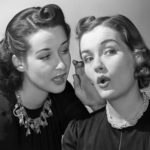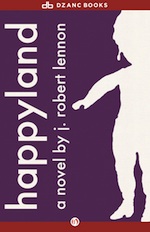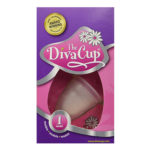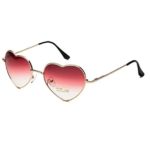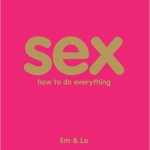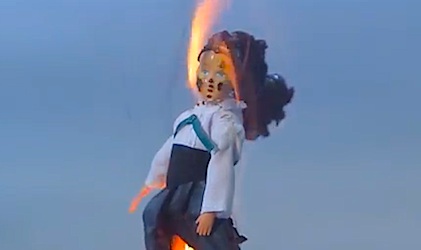 a still from the video trailer of Happyland
a still from the video trailer of Happyland
Last week, we posted a provocative excerpt from HAPPYLAND, written by one of the coolest authors we know, J. ROBERT LENNON. The excerpt was from his new novel, the one that W. W. Norton pulled from production in 2005 over fears of libel, that Harper’s Magazine ran in serial (though heavily abridged) in the fall of 2006, and that Dzanc and Open Road finally published in unabridged e-book form last week. (It’s a New and Notable pick on Amazon for the month of October.) Below is the next scene in the book after last week’s excerpt. If you’re like us, you’ll want to buy the book after reading it. If you still need more convincing, check out the excellent video at the bottom of this post about the story behind this book that almost wasn’t.
While the student population of
Equinox was gathered inside the Furman auditorium, the village of Equinox stood quiet and colorless in the November air. Evening had come; it was past eight, and the snow that had been drifting in flurries all day had begun to fall in earnest, and the patches of grass that had remained visible over the past week were soon covered over. Smoke emerged from chimneys, lights came on in windows, and traffic dwindled until only a car or two passed by every now and then.
On campus, the quiet seemed eerie, as if the college had closed for good. Only if you happened to pass by the auditorium would you discover where everyone had gone: by eight-thirty or so the hoots, grunts, and chants of the student body had reached a stunning pitch, and a passerby might have been forgiven for imagining that they’d been replaced by an entirely different set of young women, so striking was their transformation. This same passerby would also be very curious about what, exactly, had effected this transformation, but because the lowest-reaching windows were more than eight feet off the ground, and because these windows were curtained, any such discovery was, unfortunately, impossible.
Unless of course the passerby happened to be standing in a certain spot, where the curtains were slightly parted, and happened to look up and toward the rear of the auditorium, where a mezzanine-mounted spotlight, its bulb burned out, reflected, wavily upon its red-filtered gel, a tiny crimson reflection of what was happening on stage. And if this passerby should have had upon his person a pair of binoculars, or opera glasses, or extraordinarily acute vision, he might have made out in this reflection a peculiar tableau: a naked woman, bent over a rather clinical, examination-style table, her face twisted in what might, at this distance, appear to be pain, and might appear to be pleasure; and behind this woman a younger woman, short-haired, blond, dressed rather mannishly in jeans and a flannel shirt, and more importantly some sort of harness around her hips, which appeared to support a, frankly, penis-shaped object that the younger woman was thrusting repeatedly into the naked woman’s nether regions; and finally (and perhaps most peculiarly) a third woman, small and wizened and dressed in black, who stood beside the naked woman, pouring her small paper cups of water for her to snatch and empty into her mouth, much in the manner of a long-distance runner in his final, dehydrated miles.
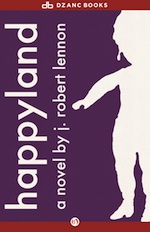
Of course this passerby, if he existed, would shake his head in puzzlement and dismay, dismissing this bizarre scene out of hand, for surely no such activity could be taking place at this august institute of higher learning. He might, in fact, decide upon a brisk walk to clear his head, and his snowbound wanderings might take him all the way to the northern edge of town, where he might observe two women in shorts—one wearing a tank-top as well, and the other only a bra—emerge, obviously drunk, from the back door of the octagonal kiosk that in summertime served as a popular ice-cream shop. He would also notice that these women were both covered in blood—on their faces and shoulders and half-bare chests—and that, despite obviously having recently beaten the living crap out of one another, they seemed to be getting on like the best of friends, their arms draped around one another, their voices loud and effervescent with laughter. If this were a local passerby, he might even notice that these women were Jennifer Triesman and Happy Masters, and if he happened to know them personally, this union would seem to him almost as unlikely as the sexually deviant bit of theater he’d come here to clear his mind of.
We can only hope, then, that our passerby, seeking to disinfect his troubled mind with drink, wouldn’t happen to drop by the Goodbye Goose, Dave Dryer’s now-defunct bar, and throw open the door. No—we would encourage him to leave Equinox immediately for an extended vacation, or perhaps forever. Because we would not want him to see poor Dave lying shirtless on a floor now cleared of tables and chairs. We wouldn’t want him to look into Dave’s red, sleep-deprived eyes, or smell the horrible pain-killing poultice, discovered by chance in one of Kevin’s father’s mildewed survivalist magazines, that he has made himself out of ingredients he found in the woods, and applied liberally to his jaw. And we certainly wouldn’t want our passerby to see the deer rifle that lay in pieces upon a stained bedsheet upon that same floor, nor the speed with which Dave was now, after days of incessant practice, able to reassemble, load, and arm the gun. For if our passerby were to have this particular experience, he might never recover, believing himself to have gone mad.
Go, passerby, go: leave Equinox and don’t come back.
Happyland is available as an e-book from Amazon.com.






